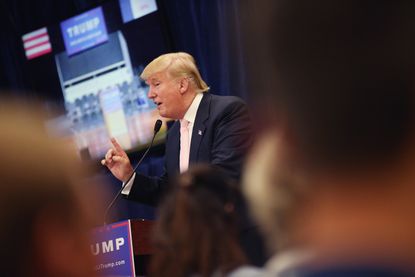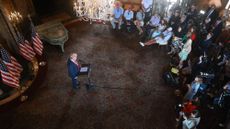Sorry, Donald Trump: America needs birthright citizenship
It's the thing that makes America great and exceptional. What's not to like?


Conservatives usually believe in American exceptionalism, and in upholding the Constitution. Which is why it's strange to see so much conservative ebullience over Donald Trump's proposal to end birthright citizenship.
It's not news that there are a significant number of Americans who are anxious about immigration — illegal and otherwise — and that they exert considerable political clout (though ultimately less than is sometimes breathlessly suggested). And many of those people fret about so-called "anchor babies." The problem with "anchor babies" is that they're a myth. (Trust me. As a Frenchman with a fertile wife who often wanted to emigrate to the U.S., I did the research.)
This fight therefore nicely serves to highlight the fact that most (though not all) fears related to immigration belong more to the realm of fantasy than reality.
Subscribe to The Week
Escape your echo chamber. Get the facts behind the news, plus analysis from multiple perspectives.

Sign up for The Week's Free Newsletters
From our morning news briefing to a weekly Good News Newsletter, get the best of The Week delivered directly to your inbox.
From our morning news briefing to a weekly Good News Newsletter, get the best of The Week delivered directly to your inbox.
But it also illustrates something else: how the restrictionist position is all too often born of a lack of confidence in the American project.
After all, the two are inseparable. Birthright citizenship says, quite explicitly, "The American project is so strong, our culture is so strong, our values are so strong, that any baby born on our soil, no matter where his parents come from, will ultimately grow up to be a well-adjusted American, so that we don't need to wait for him to prove himself to extend citizenship."
In contrast, the movement to end birthright citizenship says, essentially, "Nope, sorry, that's not true. We can't do it. We can't do it anymore."
Which, again, goes to highlight the tension between extreme restrictionism in immigration and conservative values. Conservatives typically display above average, not below average, confidence in the American project and in the capacity of judicious applications of American patriotism to solve problems.
There's another funny intersection between birthright citizenship and the conservative worldview, and I have an unusual window into it. As I said, I'm a Frenchman. France and the United States are unusual in both being nations explicitly founded (or refounded) on Enlightenment values. And one trait they share is that they both instituted birthright citizenship.
One reason was the Enlightenment-driven belief, over and against the feudalism that prevailed in most places in Europe, that citizenship depended on a social contract, not a bloodline, and that your parentage should not therefore change your citizenship status.
But there was another reason (and here lies an entire critique of the Enlightenment, which is a whole 'nother can of worms), a reason we're not too comfortable with today: empire. The institution of birthright citizenship in France was enacted by France's revolutionary government and ratified by Napoleon's civil code, partly so citizens could be pressed into duty in the army. As France expanded, so did its citizenship rolls, as did its citizen army, as did its military might, all in a virtuous cycle (virtuous, at least, from Napoleon's perspective).
The U.S. enacted birthright citizenship for different reasons, to ensure the citizenship of freed slaves after the Civil War. But the point is that birthright citizenship is historically associated with confidence in the national project, perhaps even supreme confidence.
Oh, and how did it do in France? Well, we got scared of immigrants, so we got rid of birthright citizenship piecemeal over the past few decades.
So here's the other odd thing about the birthright citizenship debate: American conservatives saying they want to be more like France. Kudos!
Sign up for Today's Best Articles in your inbox
A free daily email with the biggest news stories of the day – and the best features from TheWeek.com
Pascal-Emmanuel Gobry is a writer and fellow at the Ethics and Public Policy Center. His writing has appeared at Forbes, The Atlantic, First Things, Commentary Magazine, The Daily Beast, The Federalist, Quartz, and other places. He lives in Paris with his beloved wife and daughter.
-
 How might Trump's second term affect the free press?
How might Trump's second term affect the free press?Today's Big Question The president-elect has previously pledged to go after his supposed 'enemies' in the media
By Justin Klawans, The Week US Published
-
 Amanemu: an ultra-luxury onsen retreat in Japan's Ise-Shima National Park
Amanemu: an ultra-luxury onsen retreat in Japan's Ise-Shima National ParkThe Week Recommends Soak in blissful private solitude among pine-cloaked hills and steamy hot springs
By Scott Campbell Published
-
 Today's political cartoons - December 23, 2024
Today's political cartoons - December 23, 2024Cartoons Monday's cartoons - immigrant jobs, crypto scams, and more
By The Week US Published
-
 US election: who the billionaires are backing
US election: who the billionaires are backingThe Explainer More have endorsed Kamala Harris than Donald Trump, but among the 'ultra-rich' the split is more even
By Harriet Marsden, The Week UK Published
-
 US election: where things stand with one week to go
US election: where things stand with one week to goThe Explainer Harris' lead in the polls has been narrowing in Trump's favour, but her campaign remains 'cautiously optimistic'
By Harriet Marsden, The Week UK Published
-
 Is Trump okay?
Is Trump okay?Today's Big Question Former president's mental fitness and alleged cognitive decline firmly back in the spotlight after 'bizarre' town hall event
By Harriet Marsden, The Week UK Published
-
 The life and times of Kamala Harris
The life and times of Kamala HarrisThe Explainer The vice-president is narrowly leading the race to become the next US president. How did she get to where she is now?
By The Week UK Published
-
 Will 'weirdly civil' VP debate move dial in US election?
Will 'weirdly civil' VP debate move dial in US election?Today's Big Question 'Diametrically opposed' candidates showed 'a lot of commonality' on some issues, but offered competing visions for America's future and democracy
By Harriet Marsden, The Week UK Published
-
 1 of 6 'Trump Train' drivers liable in Biden bus blockade
1 of 6 'Trump Train' drivers liable in Biden bus blockadeSpeed Read Only one of the accused was found liable in the case concerning the deliberate slowing of a 2020 Biden campaign bus
By Peter Weber, The Week US Published
-
 How could J.D. Vance impact the special relationship?
How could J.D. Vance impact the special relationship?Today's Big Question Trump's hawkish pick for VP said UK is the first 'truly Islamist country' with a nuclear weapon
By Harriet Marsden, The Week UK Published
-
 Biden, Trump urge calm after assassination attempt
Biden, Trump urge calm after assassination attemptSpeed Reads A 20-year-old gunman grazed Trump's ear and fatally shot a rally attendee on Saturday
By Peter Weber, The Week US Published